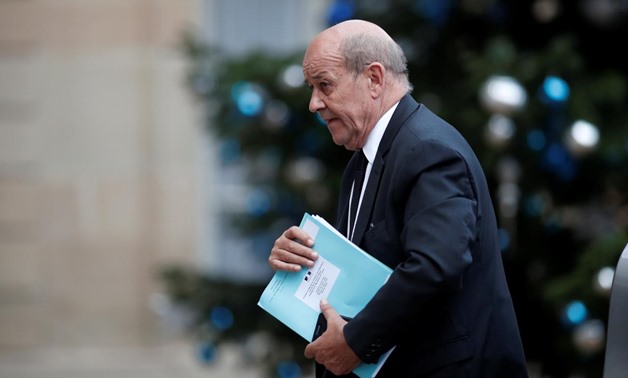
French Foreign Affairs Minister Jean-Yves Le Drian arrives at the Elysee Palace in Paris, France, January 5, 2018. REUTERS/Benoit Tessier
PARIS - 22 January 2018: France's foreign minister said on Sunday he would visit Iran on March 5 to discuss its ballistic missile programme and the nuclear deal agreed with world powers in 2015, as tensions between the two countries rise.
In an interview with daily Le Figaro to be published on Monday, Jean-Yves Le Drian said he would discuss the landmark nuclear deal after U.S. President Donald Trump's January 12 ultimatum to Britain, France and Germany to "fix" the deal or he would withdraw.
"A country that goes back on its word devalues its word," Le Drian said.
Tensions between Iran and France have risen in recent months with both sides repeatedly trading barbs in public, including le Drian accusing Iran of "hegemonic temptations" in the region.
Iranian officials have been particularly aggrieved by France's criticism of its ballistic missile tests and suggestions of possible new sanctions over the program.
Iran has repeatedly said its missile programme is purely defensive and dismisses Western assertions that its regional activities are destabilising.
"If Iran wants to return to the concert of nations, it must cooperate on these questions," said Le Drian, who postponed a trip to Tehran earlier this month because of demonstrations in the country.
"Otherwise, it will with reason always be suspected of wanting to develop nuclear weapons," he added.
Under the U.N. resolution enshrining the nuclear deal with the United States, Iran is "called upon" to refrain from work on ballistic missiles designed to deliver nuclear weapons for up to 8 years. Some states argue that this language does not make it obligatory.
Iran has denied that it has missiles designed to carry nuclear warheads.
Le Drian said he would also raise what he called Iran's "destabilising military influence in the Middle East", notably its support for Lebanon's Hezbollah and Yemen's Houthi militias.
With Trump warning of a last chance for "the worst deal ever negotiated", Britain, France and Germany have begun talks on a plan to satisfy him by addressing Iran's ballistic missile tests and its regional influence while preserving the 2015 accord.

Comments
Leave a Comment